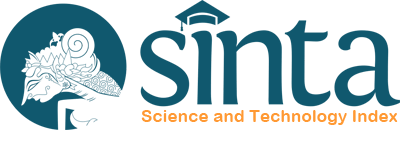Calibration of the BMP280 and ESP-12S Based Wireless Atmospheric Pressure Measure Equipment Using a Pressure Chamber
Abstract
In order to study and practice the method of meteorological atmospheric pressure gauge calibration, the design, assembly and calibration of an experimental wireless atmospheric pressure gauge based on the BMP280 digital pressure sensor and the System on Chip ESP-12S has been carried out. Using the Vaisalla PTB330 digital barometer secondary pressure standard, the instrument is calibrated in the pressure chamber in the pressure range 850-1050 hPa with a maximum tolerance limit of ± 0.15 hPa at a 95% confidence level. Based on the test results of the correction parameters and U95, it shows that the reliability of the sensor interface system and the internal correction application method used in the calibration process provide calibration results that meet the requirements of the WMO standard. The precision test on repeatability conditions based on ISO5725: 1994 is also used as a measure of tool precision. Through this calibration report, the performance and accuracy of the BMP280 sensor in relation to measurements on meteorological objects, especially atmospheric pressure can be known and studied further.
Downloads
References
[2] J. Cohen, P. Cohen, S. G. West dan L. S. Aiken, Applied Multiple Regression/Correlation Analysis for the Behavioral Sciences 3rd Edition, Mahwah - New Jersey: Lawrence Earlbaum Associates, 2003, pp. 88.
[3] B. N. Taylor dan C. E. Kuyatt, NIST Technical Note 1297 : Guidelines for Evaluating and Expressing the Uncertainty of NIST Measurement Results, Washington: U.S. Government Printing Office, 1994, pp. 5- 8.
[4] R. Wicklin, “Coverage probability of confidence intervals: A simulation approach,” 2016. Available from: https://blogs.sas.com/content/iml/2016/09/08/coverage-probability-confidence-intervals.html, diakses 10 Oktober 2019.
[5] Bureau of Indian Standards, “Accuracy (Trueness and Precision) of Measurement Methods and Results (IS 15393-6),” October 2003. Available from: https://law.resource.org/pub/in/bis/S01/is.15393.6.2003.pdf, diakses 30 September 2019.
[6] A.-N. Spiess dan N. Neumeyer, “An Evaluation of R² as An Inadequate Measure for Nonlinear Models in Pharmacological and Biochemical Research: A Monte Carlo Approach,” BMC Pharmacology, vol. 10(6), 2010, pp. 1-10.
[7] J. Frost, “Standard Error of the Regression vs. R-squared,” 2017. Available from: https://statisticsbyjim.com/regression/standard-error-regression-vs-r-squared, diakses 26 September 2019.
[8] Bureau of Indians Standard, “Accuracy (Trueness and Precision) of Measurement Methods and Results (IS 15393-1),” September 2003. Available from: https://law.resource.org/pub/in/bis/S01/is.15393.1.2003.pdf, diakses 15 June 2020].
[9] J. J. Cahir, “Weather Forecasting,” 2019. Available from: https://www.britannica.com/science/weather-forecasting/Long-range-forecasting, diakses 23 September 2019.
[10] D. Markucic, “How to Determine Repeatability and Reproducibility (R&R),” dalam 3rd European-American Workshop on NDE Reliability, Berlin, 2002.
[11] S. Gregoire, “Repeatability Reproducibility with A Standard Method ISO 5725-2,” dalam 7th ISTA Seminar on Statistics, Hohenheim, 2005.
[12] P. Assam Nkouibert, K. Mintiens, K. Knapen, Y. Van de Stede dan G. Molenberghs, “Estimating Precision, Repeatability, and Reproducibility From Gaussian and Non-Gaussian Data: A Mixed Models Approach,” Journal of Applied Statistics, vol. 37(10), 2010, pp. 18-20.
[13] D. Groselj, “Guidance on Instrumentation for Calibration Laboratories Including RICs,” Geneva, 2010.
[14] J. Frost, “Curve Fitting using Linear and Nonlinear Regression,” 2017. Available from: https://statisticsbyjim.com/regression/curve-fitting-linear-nonlinear-regression, diakses 26 September 2019.










